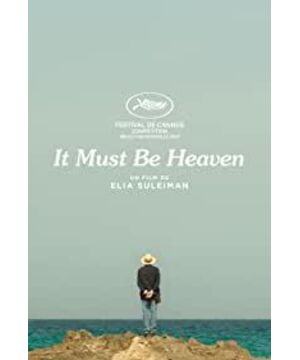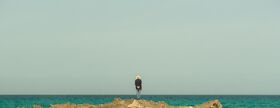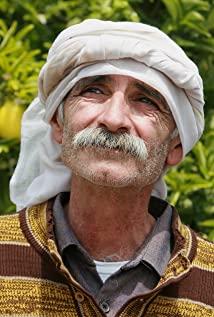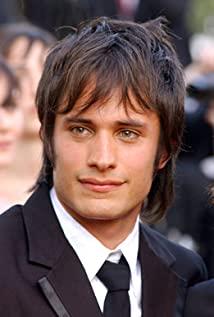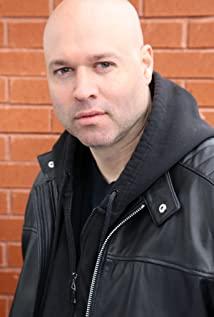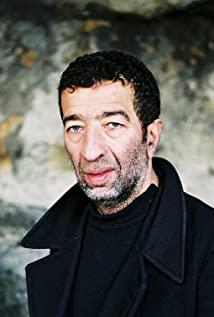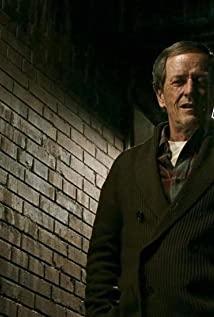Interview with Liu Ying
edit soda flavor
write in front
Suleiman has never been an anxious creator. As a Palestinian director, his life is full of experiences of separation and exile, and it is from his travels that he is looking for creative materials and has an endless sense of curiosity and love for a foreign land. The nostalgia for his homeland constitutes the most primitive tension of his works.
The three-part narrative of "It Must Be Heaven" (Special Jury Prize at Cannes Film Festival 2019, Fabisi Films Guild Prize in Competition) consists of the director/protagonist's experiences in Nazareth, Paris and New York. Nazareth is his hometown, where he spends his days watering the flowers, smoking a cigarette, talking to his neighbors, and watching the yard stealing fruit. It is full of oriental mysterious prophecy, but at the same time it seems a little cloudy. Suleiman also embarked on a journey to find "paradise".
Flying into the sky and landing in the Western world, he was greeted by an increasingly elusive reality. In the passages of Paris and New York, this sense of absurdity is brought to the fore. Suleiman is not afraid to display everyday passages. Although he claims not to use any social media, he has already mastered the charm and magic of the fragmented communication of social media. Is the Western world really heaven? In this film, Suleiman gives a clear negative answer. The Parisian producer told him that his films were not "Palestinian" enough, and that stereotypes of the third world in developed countries came to life on the screen.
Throughout the contemporary film industry, there are only a handful of directors who have created like Ilya Suleiman, especially in the bleak environment of the third world film collective, who can inherit from Chaplin, Keaton and Jacques Tati. Suleiman, who has a great tradition of comedy and uses this genre to focus on current affairs, shows the absurdity of contemporary life incisively and vividly with joy and bitterness. He likes to play roles in his films, not only the creator of all stories, but also the observer, even as "innocent and ignorant" as the audience, trying to figure out the trivia around him.
The following interview was born out of a small chat with the director in Qatar in November 2019. At that time, "It Must Be Heaven" had its own Middle East premiere at the Ajyar Film Festival in Doha as the opening film. Suleiman appeared frequently at various events and was treated to the highest standards. After the screening, I bumped into the director who was going to attend the master class in the elevator. He jokingly asked me if I had seen a psychiatrist after watching the film. I replied, "Rather than go to the doctor, schedule an interview with me". He agreed. So the next day, while he was drinking his fifth cup of coffee of the day, we chatted about him and his "Palestinian Movie." At the end, he asked earnestly, "My friend Labaki said that "Capernaum" performed well in the Chinese market. My film was also bought by Chinese buyers. You said, is it possible for it to be in your theaters? show in?"
Deep Focus People often associate "comedy" with brisk and even vulgar cultural consumption, especially in our age of entertainment to death. Why is this form particularly important in your creations?
Suleiman
In fact, there are many subjects that need comedy to express, especially when it comes to heavy topics, this method is especially effective. Throughout the history of literary and artistic creation, there have been numerous successful works in front of us. What I'm doing is, like squeezing a sponge, to extract a bit of humor from my surroundings at a time of general desperation. Of course, if I had to say, the situation is really bad right now. If you had to count how many people lost their lives in turmoil and war, you would feel dark. This is why I feel that my creations should be viewed and spread.
When you set out to create visuals—whether it’s a painting or a movie—your goal is to create some kind of pleasure. Of course, "pleasure" does not mean "superficial", and the pleasure of viewing can be expanded in multiple dimensions. As a creator, I don't want to teach the audience how to laugh at all. I want them to ask questions after the viewing, and during the viewing, they should be as immersed in their senses and emotions as possible.
"It Must Be Heaven" actually continues my consistent creative style, and its appeal is not much different from my previous works. If it were to be said differently, presumably the film reflects more desperation, with more extreme humor. As I always say, "the worse things get, the more laughter". This is how I created it, and I don't know how to do it otherwise.
Focusing deeply on the creative stage, how did you incorporate the observed absurd moments into the script?
Suleiman
I think you've noticed, too, there's a long gap between each of my films, and my screenwriting cycle is a long one. So a certain segment in the movie might have come from an inspiration I had twenty years ago, and they are like red wine, becoming more and more alive with time. Like many creators, I carry a notebook with me, jot down ideas and put them aside for a long time, trying to translate some of them into cinematic language if the opportunity arises. Much of what you're seeing now stems from my long hours of observation, musing, imagining, and daydreaming about life.
However, unlike traditional film creation, the scenes transformed from every small idea in my film are self-contained, they have independent and self-consistent logic, and each scene tells a small story. story. And when I want to add other stories to it, I need to find a nexus between them and a natural way of editing, like completing a puzzle. Under the grand narrative of the film, each segment is carrying out its own narrative, thus forming a "multi-channel" effect.
There is basically a gap of seven to eight years between each of your feature films.
Suleiman
Yes, but between the last feature films "Time Is Still" and "It Must Be Paradise", I actually went to Cuba to make a documentary (Note: "A Week in Havana", a collection of short films created by seven directors. Un Certain Regard premiered at the 2012 Cannes Film Festival), though it may be seen by fewer people.
The preparation for "It Must Be Paradise" actually started in 2017. The financing of this film was not so smooth, because its investment was higher than that of my previous works. You also know that the global film industry has not So prosperous. Fortunately, despite the difficulties, with the support of many parties, I still started shooting. (Note: Countries including France, Germany, Qatar, and Canada participated in the production of this film). Of course, co-production in multiple countries is not an easy task. The film was shot in three locations (Palestine, France, and the United States), which was a great challenge at the production level, and therefore scared many producers away.
So I'm very happy that "It Must Be Heaven" is the opening film for the Ajyar Film Festival in Doha, Qatar, and the Doha Film Institute has provided the necessary support for this project, and it can be said that without them, the film would not have started. .
Deep Focus You repeatedly mentioned observation and contemplation, but also that filmmaking is the process of constructing a "continuum." In the film, we follow the protagonist with few words on his journey around the world, who explores silently and does not seem to rely on dialogue to communicate with the outside world. In your opinion, does this way of "seeing" allow us to better understand the world around us than words?
Suleiman
"Speech" is just one type of "language" and too much attention has been paid to it. In fact, most of the time, we get along with ourselves in silence. Second, I think there's a tendency for "words" to be abused, especially in film, because it's such a handy tool that people use to construct narratives. But this use can be habitual and unthinking, it makes the narrative linear, and to some extent limits the use of film language. Viewers tend to get information only through "words" during the viewing process.
I also use "words" of course, but more as a marker of time, to create a distinct sense of rhythm, like the role of percussion in a band. You will find that most of the words in my films are in the form of "monologues", and I try to weaken their function of conveying information. I think the use of ambient sound, music and even silence, in the right visual form, can convey what I want to express. It's even more fascinating to me. For the audience, this provides them with a more democratic way of seeing films, where the director is no longer the "monarch" and the sole provider of meaning. Getting the audience involved in the creative process is also a great source of fun for me, much more fun than imposing information on the audience. This is closer to the experience of visiting a museum or gallery, where the creator doesn't hold you down in front of a painting for ten minutes, and the fluidity and autonomy of the viewer is guaranteed.
I don't think of movies as a "single-view" art form, the most important thing to me is not how to tell a story in a drip, but how to create the atmosphere for the audience to daydream so that when they leave the theater, Take away your own memories. I see it as more effective, more spiritual communication. Of course, I'm not at all against that kind of highly provocative film, where the audience can't wait to hold hands in a ball after watching it. Today's society also needs such films, but this is not my creative focus.
Focusing on a scene in the film, the French producer tells the film's director that the theme he wants to convey "isn't enough Palestine." I believe it was a moment of reflexivity. As a Palestinian creator, your films often involve collaborations across countries and regions, and you have strong European ties. Are you using this scene to criticize the so-called mainstream Western audience's stereotypes about third world movies?
Suleiman
First of all, mainstream Western audiences are not the audience for my kind of films, they are more immersed in commercial films, and I have no intention of judging their reactions here, they are innocent. On the contrary, what I am targeting is the elite group of Western intellectuals who are the builders of postcolonial discourse, the system that generates the categorization of films and their themes and the stereotypes that come with them.
I would like to take this topic to the next stage. In my opinion, the current stereotype is not limited to Western society. With the development of post-colonial thinking today, “self-colonialism” should be paid more attention. When political correctness becomes the mainstream discourse, you will find that the so-called emphasis on Palestine and feminism is just placing these objects in the cage of another language. The scene you mentioned is indeed my own experience, a French producer told me when I was working on my debut. Although this happened a long time ago, I think it's still relevant. Postcolonialism in disguise still lingers at our door. This really needs our vigilance.
The truth is, I don't think we can escape the shackles of a neoliberal economy, especially in the context of globalization, and this theory is still seen by many as a fairly useful tool. Personal life is completely occupied by the market economy, and the cognitive process of identity is still full of a strong sense of isolation. In this sense, Must Be Heaven is not a film "about Palestine," but a film about "the global as Palestine," my home country is just a metaphor here.
In the Deep Focus Paris section, you have a pretty nice interaction with a bird indoors. The significance of this scene has also sparked considerable discussions between me and my friends. Very curious, what is the official version of the explanation you will have?
Suleiman
What is your interpretation?
Deep Focus My friend said, isn't this bird just "twitter"? When you are going to work, you always want to click on Twitter to take a look.
Suleiman
Ha ha! I never use twitter or social media. I'm glad you asked this question. From the feedback I've received, a lot of people will have their own thoughts on this scene and feel that it's more or less connected to their own lives, but can't tell why. I like the feeling of being unclear and unclear.
During the scripting stage, some people were also quite critical of the scene, asking me what it meant and worried that it would break the rhythm of the film. I told them that this scene is for "seeing", not for "reading". Actually here, my ambition is that I try to demonstrate a scene as what it is, the bird is the bird, and I am me. There are no signifiers, no metaphors, until the purest poetry, what the audience can get is the joy of watching. Maybe in future creations, I will go further on this road of exploration. So, the significance of this scene is that it shows endless possibilities to the audience, it is not limited by any official interpretation, it is a "weightless scene" floating in the air. But then again, it's a lot of work to use a computer to synthesize a bird that moves all the time.
Deep Focus You have emphasized on many occasions that the new generation of young people is the hope of the world, and the ending of "It Must Be Heaven" also shows an optimistic and upward atmosphere.
Suleiman
I must say that I was not so optimistic, but in the process of contacting and even colliding with this generation, my hope has been rekindled. They have a more organic view of "what is Palestine" than spinning around in narrow nationalism. They are growing up as anarchists and pacifists, tied to their cognitive progress on issues of race and gender.
In the past years, I have traveled to all corners of the world, and there are many places that I call "home", but I feel all the time how I have no place to live, even in my own country. This feeling is like a shadow. But this group of young people, who stay in their own small world, have an unprecedented close connection with the world. The way they express themselves is so fascinating, and the way and why they band together has nothing to do with ideology. They celebrate "moments" and that's the most subversive, because you can't make an accurate judgment about how they're being expressed, and therefore, as I said before, you can't lock them into definitions or words in the cage.
The dancing young man at the end of the film is the embodiment of this generation. They are so unpredictable that you don't know what to do with them. It's quite poetic, more powerful than any slogan or slogan.
View more about It Must Be Heaven reviews


